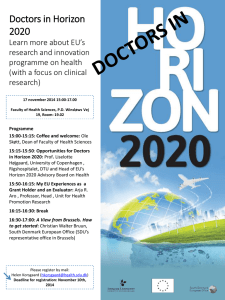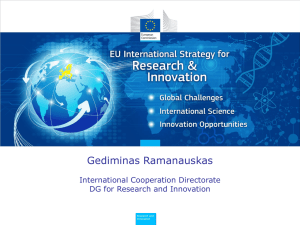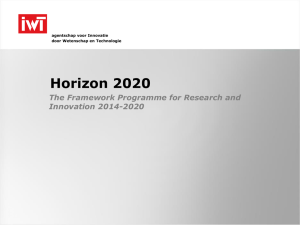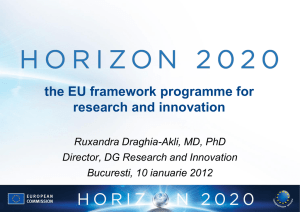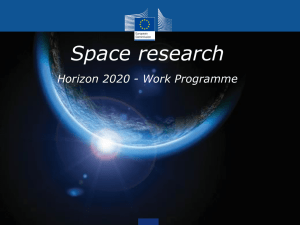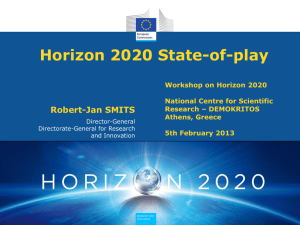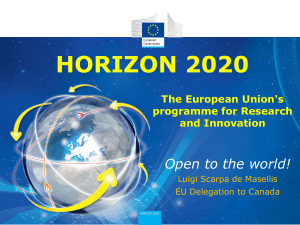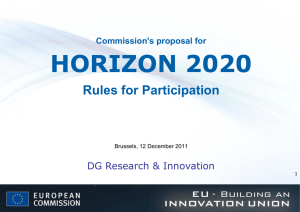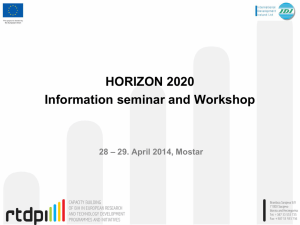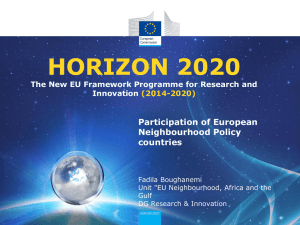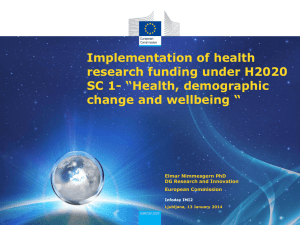Funding opportunities in Horizon 2020
advertisement
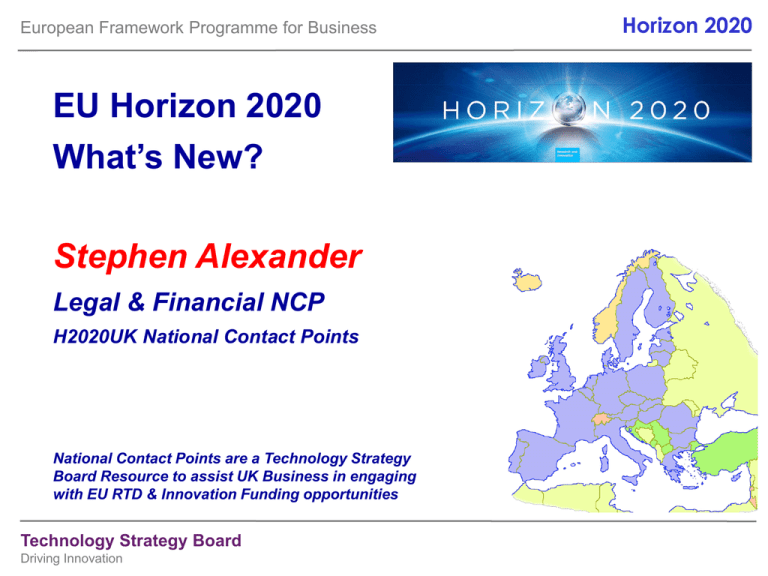
European Framework Programme for Business EU Horizon 2020 What’s New? Stephen Alexander Legal & Financial NCP H2020UK National Contact Points National Contact Points are a Technology Strategy Board Resource to assist UK Business in engaging with EU RTD & Innovation Funding opportunities Technology Strategy Board Driving Innovation Horizon 2020 Horizon 2020 FP7 2007-2013 ~ €52b People 4,750 M€ Capacities 4,097 M€ Ideas 7,510 Cooperation 32,413 M€ Technology Strategy Board Driving Innovation Horizon 2020 Co-operation programme: budget breakdown Space Socio-Economics Security Health Transport Food Ag & Biotech Environment Energy ICT Nanotechnologies, Materials and Processes Technology Strategy Board Driving Innovation European FrameworkHorizon Programme2020 for Business – objectives & structure FP7UK Europe 2020 priorities International cooperation European Research Area Shared objectives and principles Tackling Societal Challenges Health, demographic change and wellbeing Food security and the bio-based economy Secure, clean and efficient energy Smart, green and integrated transport Climate action, resource efficiency, including raw materials Inclusive, innovative and reflective societies Secure societies Creating Industrial Leadership and Competitive Framework Information and Communication Technologies (ICT) Nanotech. Materials, Manf. & Processing Biotechnology Space Access to risk finance Innovation in SMEs Excellence in the Science Base • • • • Frontier research (ERC) Future and Emerging Technologies (FET) Skills and career development (Marie Curie) Research infrastructures Simplified access Common rules, toolkit of schemes Coherent with other EU and MS actions funding Horizon 2020 Budget distribution Technology Strategy Board Driving Innovation Horizon 2020 H2020 Changes 1. A new structure and focus • Only one Specific Programme • 3 main pillars • More focus on societal challenges rather than specific Technologies • More focus on innovation, closer-to-market activities • More cross-cutting activities 2. New programming cycle • Three year strategic programming, cutting across all pillars • This drives 12 focus areas food security, health care, green energy, security....) • Encapsulated in two-year work programmes and related funding opportunities Technology Strategy Board Driving Innovation Horizon 2020 Funding opportunities in Horizon 2020 • Some are broadly similar to FP7 and recognisable • ERC, MSC, FET, infrastructures • Technology ‘Themes’ in LEIT – ICT, NMP, Space, Biotechnology • But: • Big focus (& budget) in societal challenges • Shift in TRLs in LEIT (as well as societal challenges) Technology Strategy Board Driving Innovation Horizon 2020 Rules for Participation: what’s new? • PARTICIPATION PROCESSES SIMILAR TO FP7 • Workprogrammes, calls, proposals, evaluation, grant – BUT... • SIMPLE & UNIFORM EVALUATION CRITERIA • Excellence • Proposals – Impact – Implementation evaluated ‘as-is’ – no more ‘negotiations’ • Compressed grant preparation period could impact Consortium agreement timescales? • MARIE CURIE REFERENCE RATES REDUCED: also impacts scale of unit costs for SME owners without a salary (i.e. only two Marie Curie reference rates, 1720 productive hours, 25% indirect costs – reimbursement lower than FP7) Technology Strategy Board Driving Innovation Horizon 2020 Rules for Participation: what’s new? • AUDIT CERTIFICATE(CFS) • Only at final cost claim and Reimbursement >€325k • Can be claimed as ‘other’ direct cost (not subcontract) • LARGE RESEARCH INFRASTRUCTURE COSTS • Overhead costs for large research infrastructures claimed as ‘direct’ • Methodology and inspection required • TRAC costings could be basis for this? • LESS INPUT ON PROPOSAL IDEAS FROM COMMISSION OFFICERS • No formal ‘pre-proposal’ check as in ICT Technology Strategy Board Driving Innovation Horizon 2020 Potential traps for academia! • THE INNOVATION FOCUS, TRL SHIFT, INDUSTRY INVOLVEMENT • Potentially different style of proposal • ‘Impact’ is increasingly important • Industrial and SME involvement, but... • Potential conflict between academic and industry interests? • MULTIDISCIPLINARY • Wider agenda for projects • Will come into evaluation • SMEs AND GENDER ISSUES INCREASINGLY IMPORTANT • May be used where required in tie-breaking for projects on same score Technology Strategy Board Driving Innovation Horizon 2020 UK National Contact Point (NCP) structure Technology Strategy Board Driving Innovation Horizon 2020 UK wider support • H2020 NCPs • More resource • Taken in-house by Technology Strategy Board • Greater integration with Lead Technologists, KTNs, EENs • Knowledge Transfer Networks (KTNs) • Reformed as single ‘KTN Ltd’ • The industry outreach mechanism for TSB • Some offices already established, cross-cutting function • Enterprise Europe Network (EENs) • TSB bidding for EENs in English regions • UKRO? Technology Strategy Board Driving Innovation European Framework Programme for Business Advice and Assistance: FP7UK National Contact Points Stephen Alexander Legal & Financial NCP Phone: 07771-722217 eMail: stephen.alexander@tsb.gov.uk UK Website: www.h2020uk.org.uk EU Website: www.ec.europa.eu/research/participants/portal Technology Strategy Board Driving Innovation Horizon 2020
